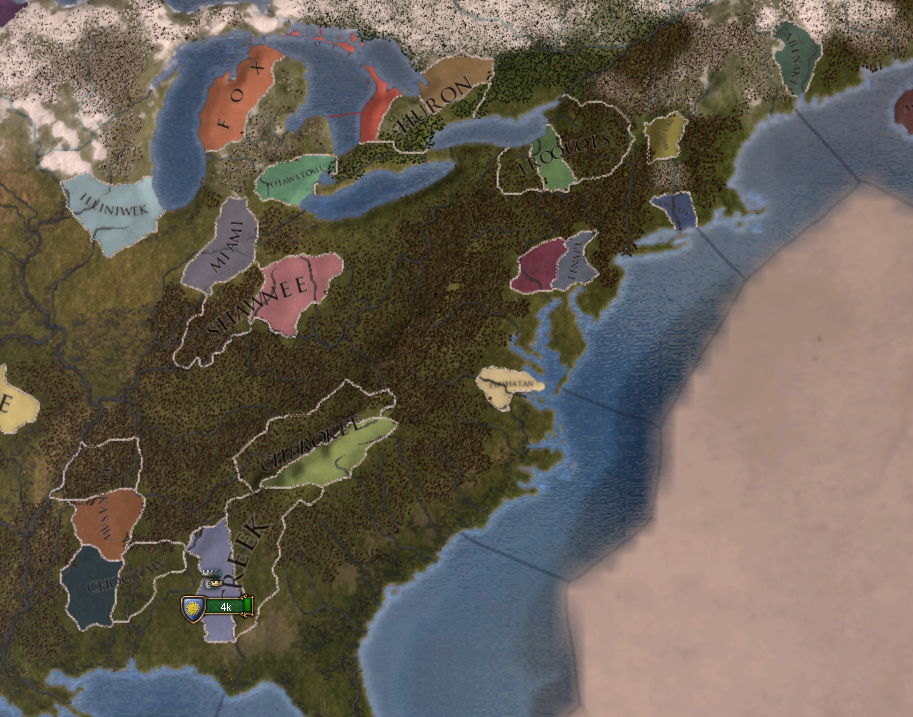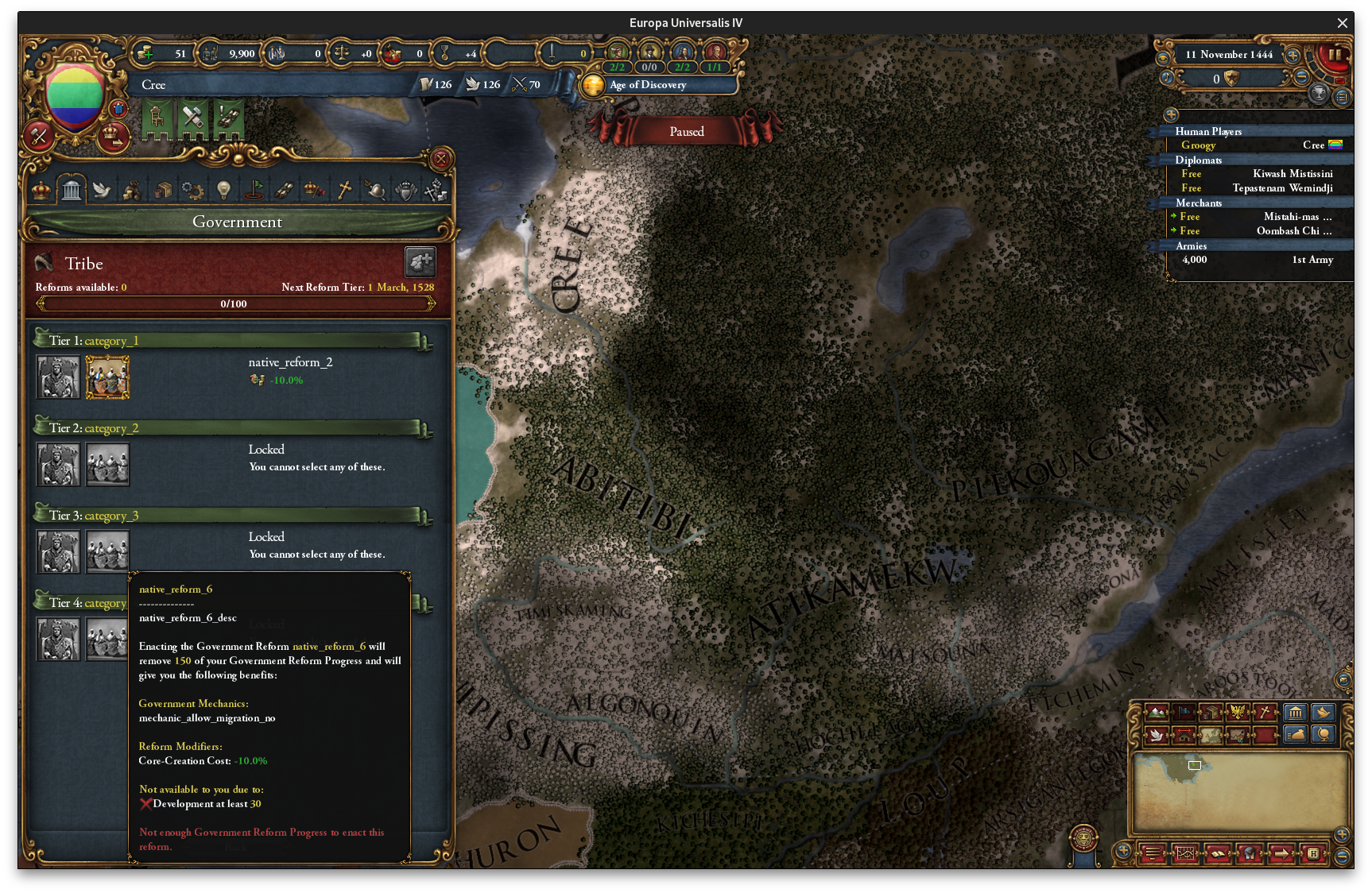Hey everyone! So there’s been quite a few development diaries from @neondt now on South East Asia telling you about the new content we’ll be adding to it, a region that had gotten a bit missed by us over the years and which very much needed some love from us. I am going to do the exact same, but an entirely different region that I have always wanted to do better than how it currently is.
I have always as a player liked playing the under dogs and as such the Americas have always been some of my favorite places to play in, to fight against the invasion of the Europeans and establishing your own nation in your own image. But the last time we really touched on the North American tribes were in Conquest of Paradise and these mechanics haven’t aged… well. If I would sum up the mechanics today of how it is to play a Migratory tribe it is to “wait”. You wait to migrate, you wait for Europeans, you wait, you wait you wait. So we decided to redo all of these mechanics that came with Conquest of Paradise from the ground up and just make North America a lot more vibrant and fun to play in. This of course will still be part of the Conquest of Paradise DLC so it’s a semi-free change
In the coming dev diaries you are going to be getting a lot of work in progress interfaces, so stay with me as my ux skills are not the best. We got a lot to cover so let's get started with the mechanics of how I’ve changed the migratory tribes.
So one thing that did bother me was how we portrayed the migration, the various people of north america didn’t usually migrate from the Appalachian to the Rockies every other decade or so. They had a concept of land that they used and seasonally migrated between, but they did consider it to “belong to them” in some manner. Now we can’t have seasonal migration as it doesn't fit how the game flows but these changes should make it more fun and meaningful to interact with.

First there's tribal ownership of land, this is sort of a semi ownership of the province, it belongs to the tribe but its resources are not being currently fully exploited. People can move in and out of these provinces freely and Europeans can even colonize them. One of the reasons why we haven’t populated the eastern seaboard much has been because it would block European colonization but with this change it allows us to actually fill out North America a bit more. Like let’s say introducing the Mississippi civilizations.
A province can be made into your tribal land by adding it at a cost for 100 Administrative Monarch Power, it also requires you to have migrated to it. If you try to integrate a province that is not connected to your already defined territory it will abandon the previous and start a new home for you at that province.
Coupled with this the migration is no longer a thing that is locked to a cooldown that you press every now and then in order to get some extra mana. Instead the feature has been reworked into something you need to do in order to keep growing as your tribe keeps depleting the natural resources of the current province you are in.

You can migrate to any province that is not directly owned by anyone, that includes into other tribes territories. Migrating currently as I’m writing this costs 50 military monarch points but it’s still up for balance tweaks. For each step though you migrate outside of your territory the cost will double. You can still migrate away to wherever you want and set up a new territory to live there instead but as you won’t be limited by a timer anymore you’ll still be limited by your monarch points.
So why would you want to migrate through? While you stay in a single province the tribe will be causing devastation in that province, until it eventually reaches a 100%. In addition to this each tribe has a tribal development that grows each month little by little as long as the province hasn't reached 100% devastation. The larger the tribe is, the faster the devastation goes up to simulate their increased consumption.

Part of appealing to the fantasy I talked previously about we’ve also redone how reformation works and integrated it into the Government Reform system instead. We’ll talk more about that in a later development diary, but the first step will be to settle your tribe which will enable you to settle your tribal development into several provinces letting you expand and grow stronger. The goal is to also have it possible for you to continue reforming your tribe without settling which will have a unique reward at the end of the tree.
How you gain reform progress is going to be different and something we are currently working on. We won’t be relying on the average autonomy as that won’t make sense and right now we have it mainly comes from buildings (that migrate with you mind you) but as always I am keen to listen to community suggestions
Native Tribes will have a new set of CB’s available to them to fit with their new way to fight wars. The migratory peace treaty has been remade to be focused around your tribal territory, you will force out any other migratory tribe that has moved into your land and make them either return home or to any border province of yours. There is also a feud CB against bordering tribes to try and take their territory away from them. And then last a CB that lets you fight off Europeans colonising in your home which will burn their colonies. (Tribes can’t use the burn colony interaction anymore and must use the CB now)
This does it for this development diary. We’ll continue to cover the new ways the native americans work next week. Cya then!
I have always as a player liked playing the under dogs and as such the Americas have always been some of my favorite places to play in, to fight against the invasion of the Europeans and establishing your own nation in your own image. But the last time we really touched on the North American tribes were in Conquest of Paradise and these mechanics haven’t aged… well. If I would sum up the mechanics today of how it is to play a Migratory tribe it is to “wait”. You wait to migrate, you wait for Europeans, you wait, you wait you wait. So we decided to redo all of these mechanics that came with Conquest of Paradise from the ground up and just make North America a lot more vibrant and fun to play in. This of course will still be part of the Conquest of Paradise DLC so it’s a semi-free change
In the coming dev diaries you are going to be getting a lot of work in progress interfaces, so stay with me as my ux skills are not the best. We got a lot to cover so let's get started with the mechanics of how I’ve changed the migratory tribes.
So one thing that did bother me was how we portrayed the migration, the various people of north america didn’t usually migrate from the Appalachian to the Rockies every other decade or so. They had a concept of land that they used and seasonally migrated between, but they did consider it to “belong to them” in some manner. Now we can’t have seasonal migration as it doesn't fit how the game flows but these changes should make it more fun and meaningful to interact with.

First there's tribal ownership of land, this is sort of a semi ownership of the province, it belongs to the tribe but its resources are not being currently fully exploited. People can move in and out of these provinces freely and Europeans can even colonize them. One of the reasons why we haven’t populated the eastern seaboard much has been because it would block European colonization but with this change it allows us to actually fill out North America a bit more. Like let’s say introducing the Mississippi civilizations.
A province can be made into your tribal land by adding it at a cost for 100 Administrative Monarch Power, it also requires you to have migrated to it. If you try to integrate a province that is not connected to your already defined territory it will abandon the previous and start a new home for you at that province.
Coupled with this the migration is no longer a thing that is locked to a cooldown that you press every now and then in order to get some extra mana. Instead the feature has been reworked into something you need to do in order to keep growing as your tribe keeps depleting the natural resources of the current province you are in.

You can migrate to any province that is not directly owned by anyone, that includes into other tribes territories. Migrating currently as I’m writing this costs 50 military monarch points but it’s still up for balance tweaks. For each step though you migrate outside of your territory the cost will double. You can still migrate away to wherever you want and set up a new territory to live there instead but as you won’t be limited by a timer anymore you’ll still be limited by your monarch points.
So why would you want to migrate through? While you stay in a single province the tribe will be causing devastation in that province, until it eventually reaches a 100%. In addition to this each tribe has a tribal development that grows each month little by little as long as the province hasn't reached 100% devastation. The larger the tribe is, the faster the devastation goes up to simulate their increased consumption.

Part of appealing to the fantasy I talked previously about we’ve also redone how reformation works and integrated it into the Government Reform system instead. We’ll talk more about that in a later development diary, but the first step will be to settle your tribe which will enable you to settle your tribal development into several provinces letting you expand and grow stronger. The goal is to also have it possible for you to continue reforming your tribe without settling which will have a unique reward at the end of the tree.
How you gain reform progress is going to be different and something we are currently working on. We won’t be relying on the average autonomy as that won’t make sense and right now we have it mainly comes from buildings (that migrate with you mind you) but as always I am keen to listen to community suggestions
Native Tribes will have a new set of CB’s available to them to fit with their new way to fight wars. The migratory peace treaty has been remade to be focused around your tribal territory, you will force out any other migratory tribe that has moved into your land and make them either return home or to any border province of yours. There is also a feud CB against bordering tribes to try and take their territory away from them. And then last a CB that lets you fight off Europeans colonising in your home which will burn their colonies. (Tribes can’t use the burn colony interaction anymore and must use the CB now)
This does it for this development diary. We’ll continue to cover the new ways the native americans work next week. Cya then!




